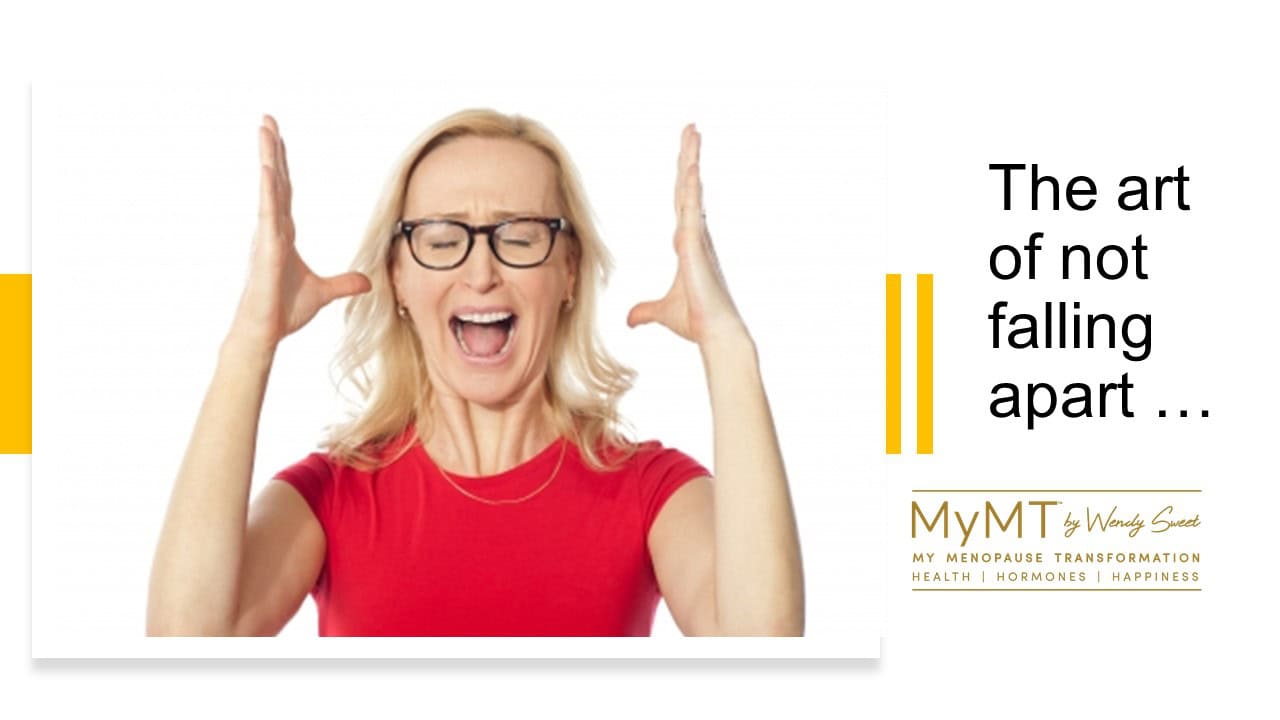I know a bit about stress. Not only my own ‘butterflies in my gut’ experiences from my former life as a nurse working in fast-paced life and death environments in Intensive Care, but also teaching about athlete stress to Sport and Exercise students. Until I did my PhD, I had never thought about how our changing hormones in menopause makes those feelings of stress and anxiety become worse.
My blog post today comes with absolute high regard for all of you nurses and other front-line staff who I know will be feeling stressed, anxious and continually in ‘alert-mode’. As usual your training will come through and you will be working at your best when you are at work. But over time, as they have found in Italy, Spain and China, your exhaustion will increase and for those of you in mid-life, so too may your hot flushes, weight and anxiety. It’s a tough time for those of you going through menopause. But you will ‘box-on’ as I know many women do. Hence, my challenge to you to find some calm within the storm.
When you can, put yourself in a bubble within your home bubble and for an hour a day, focus on releasing stress, finding calm and restoring your wellbeing. If you are feeling anxious and worried, you need to reduce your heart rate and blood pressure daily.
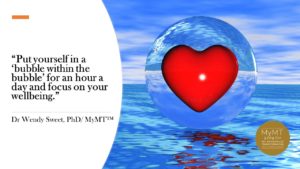
Lying on my bedside table is a book. It’s called ‘The Art of Not Falling Apart’ by Christina Patterson. If I could send it to all of you front-line workers and women on my programmes I would. But you will have to order it from Amazon on your Kindle instead and read it whilst in your bubble.
“We plan, as the old proverb says, and God laughs. But most of us don’t find it all that funny when things go wrong. Most of us want love, a nice home, good work, and happy children. So what do you do when things go wrong?” says the book introduction. For Christina Patterson, it was her job as a journalist that kept her going through the ups and downs of life. And then she lost that, too. Dreaming of revenge and irritated by self-help books, she decided to do the kind of interviews she had never done before – the result of which is her book – The Art of Not Falling Apart. Never before in our history have we needed a book such as this to take our minds off life in the bubble.
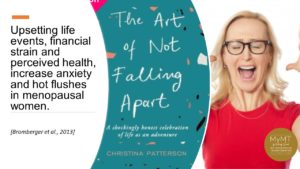
My concern is for all of you who are entering peri-menopause or those of you already in your menopause transition (when your periods have stopped for a year or more). Because the evidence from the Study of Women’s Health Across the Nation (SWAN) studies show that yes indeed, our lowering oestrogen in menopause impacts on our anxiety and stress levels. As the study states,
‘Women were more likely to report high anxiety symptoms when early or late peri-menopausal or postmenopausal compared to when they were pre-menopausal. This is independent of multiple risk factors, including upsetting life events, financial strain, fair/poor perceived health, and VMS (vaso-motor symptoms).’
Why does our anxiety increase in menopause?
Stress and anxiety are interesting phenomena. I’ve studied them both for decades, but not in the context of menopause. But rather in the context of sport and exercise science and the accumulation of physical stress in the athlete who is competing. Some stress is good, too much is bad. When athlete’s train and compete, their muscles, tendons, ligaments, cardiovascular system and gut undergo considerable ‘stress’. For athletes, the need to do this in training is how they increase their performance and ‘adapt’. It’s called the General Adaptation Response.
In other words, athlete’s need to ‘over-stress’ the body in their training to then allow them to make the physiological adaptations to become faster, fitter and stronger. But this all goes wrong when athletes don’t get their training and recovery cycles sorted (especially female athletes who have also got their hormonal health to take into consideration), then they begin to see a drop in performance.
The game-changer’ for me in understanding the physical effects of increased stress and anxiety during menopause, was understanding that the symptoms of an over-trained, exhausted female athlete doing large volumes of training, are pretty similar to the symptoms we experience in peri-menopause too.
- Insomnia
- Fatigue
- Changing thyroid function which can lead to glandular fever
- Sore and aching muscles which can lead to fibromyalgia
- Hot flushes
- Stiffer tendons
- Anxiety and brain fog.
As well, what we aren’t taking into account is that our nervous system is also changing as we lose oestrogen. It becomes more ‘irritable’ as we lose the role of oestrogen on the outer covering of our nervous system. This means that the combination of feelings of stress and anxiety (and don’t we all feel that a bit now!) as well as not sleeping and our changing hormones in menopause, can cause even more activation of our nervous system.
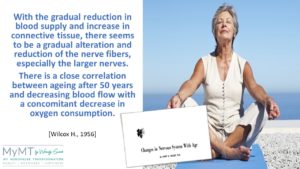
When we don’t allow our nervous system to calm down, then we stay in the ‘red zone’ of our adrenals working overtime in fight and flight mode.
Over time, if we don’t balance this out with some calming quiet time, then our chronic stress hormone called cortisol remains high. Some cortisol is good, but too much leads to more inflammation around our body. This is not a time of our lives to have more inflammation around our body, believe me.
When there is more cortisol present in our body, our lovely thyroid and adrenal hormones then work even harder to re-balance the internal system.
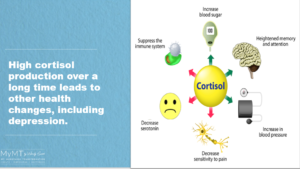
For athletes this is also when their motivation to train takes a dive, and many then begin to experience immune system health changes as well as mental health changes too. Feeling depressed anyone? Any one of you with teenage athletes in the house will know how hard it is to keep them healthy if they are doing large volumes of training and not sleeping. The technical term for this is ‘over-training‘ and it is a well-researched phenomenon in athlete conditioning and optimal training adaptation.
This effect of stress and anxiety is happening to women in menopause as well – let alone the additional stress of worrying about Covid-19.
It’s worse when we aren’t sleeping too, because very simply, we aren’t recovering. And if we aren’t recovering, we start to feel wired and tired, stressed and anxious and it’s not long before we experience ‘Burn-out’.
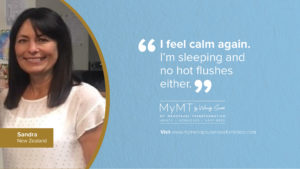
Emotional and physical stress are accumulative – and it’s not just the ‘here and now’ stress. I’m also talking about the decades-long build-up of oxidative or physical stress that manifests as inflammation and metabolic chaos in our body. If your muscles are sore, if you have fibromyalgia, if your gut health has changed, if you have put on weight, and if you are feeling hot and bothered all the time, and you aren’t sleeping, then yes, these are all signs that your body is ‘stressed’.
So, all make sure that we DE-STRESS and put ourselves in a ‘bubble within the bubble’ will we? And if you are a front-line worker, then please take a few moments every day to find calm within the chaos.
My 3 Strategies to Find CALM in the Chaos:
- Breathe better: Learning to breathe more deeply is fundamental to reducing our stress levels. I teach women on my programmes how to do a simple breathing technique called Diaphragmatic breathing. It works. So when you put yourself into your bubble within your home-bubble, then hide away and work on your breathing. It only takes a few minutes and you can do this any time throughout the day. Don’t forget that my Rebuild My Fitness home exercise programme has been reduced in price for you too (save NZ $100 – please use promo code ATHOME20). I have breathing and stretching techniques in this programme for you as well.
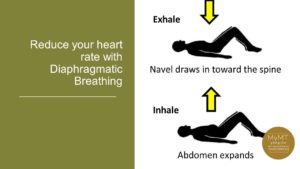
2. Don’t over-eat! Yes, it’s a stressful time and we all know that hormonal changes and feeling exhausted can cause us to binge-out on the chocolate bars you have stashed in the fridge. But your stomach and digestive system are supplied by the same nerve that stimulates your heart rate and blood pressure. Instead of working hard on digestion, this lovely long vagus nerve needs to be put to better use, helping to calm you down. If it’s always busy having to work hard on your digestion, then it is staying ‘on alert’. This is why racing around and eating on the go, can cause so many stomach issues in women as they age.
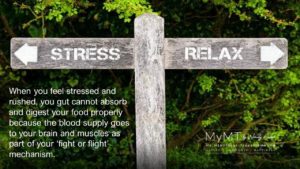
3. Find your way through difficult moments. When you take a moment to pause and think about ‘why’ you are feeling anxious (and remember that your feelings of anxiety increase if you are in menopause), then this is the starting point to getting clarity to find a way through. You need to stop and take stock of the red-zone you are in and then take another moment to get back yourself into the green-zone. This takes practice but targeting the moments when you are feeling most stressed and anxious, will allow you to change your thought processes and find your way through. I know for me, staying active absorbs anxiety. Have you moved in healthy ways today too? If you already feel stressed and anxious, then think about BALANCING this up with de-stress activities (and no, I don’t mean knocking back the bottle of wine as many women end up doing in times of stress – this just makes your liver work overtime and increases cortisol production).
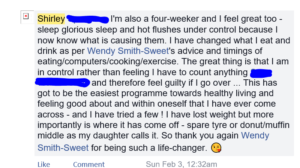
The coming weeks are going to be strenuous for all of us – but never more so, than front-line workers, so thank you from the bottom of my heart to all of you who might be reading this. As a former ICU nurse, I know what you are going through and the continual anxiety and concern that you must be feeling not only about those in your care, but yourself too. I will continue to ensure that my blogs inform you and hopefully help you, but don’t be afraid to email me as well if you need to. wendy@mymenopausetransformation.com
As well, ALL of my three programmes are on sale for you right now and because I know these are uncertain times for all of us, I have deducted $100 off the cost of these. This makes the programme and my coaching NZ$199 with payments over 3 months. [NZ$67 per month for 3 months/ AUS$66 per month for 3 months/ £UK33 per month for 3 months]
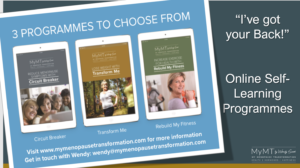
The essence of life is learning new things and you have it within you to keep learning about how to turn around your symptoms and/ or weight in menopause. My recipe book is full of healthy recipes that are simple and cost-effective and I’ve added in a Joint Health module for you too. For those of you who are allowed outside, there is also a 6-week walking programme and other wonderful advice that I post in my private coaching community as well. We are stronger together and this is the approach I’m taking with the MyMT community at the moment.
I hope you can join me.
Dr Wendy Sweet, PhD/ MyMT Founder & Coach.

References:
Egger, G. & Dixon, J. (2014). Beyond Obesity and Lifestyle: A Review of 21st Century Chronic Disease Determinants. BioMed Research International, Article ID 731685, 1-12.
Woods, N. & Mitchell, E. (2016). The Seattle Midlife Women’s Health Study: a longitudinal prospective study of women during the menopausal transition and early postmenopause. Women’s Midlife Health, 2(6), 1-16.
